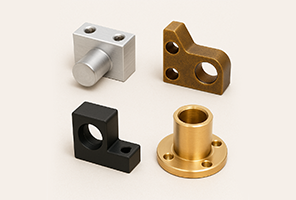
Choosing the right material for CNC machining can make all the difference in your product's performance and cost. This guide covers the various CNC machining materials available, from metals like aluminum and stainless steel to plastics like ABS and PEEK. By knowing the properties of these materials you can make informed decisions for your machining projects. CNC material selection is a critical step in determining the suitability, durability and overall success of the final machined part.
Introduction
CNC machining is a very precise manufacturing process that uses computer controlled machines to produce complex parts and components from a wide range of materials. By following a program a CNC machine can cut, drill and mill with exceptional accuracy and repeatability. This level of precision is why CNC machining is the go to process for industries like automotive, aerospace, medical and consumer products where tight tolerances and consistent quality are critical.
When selecting materials for CNC machining you need to consider factors like corrosion resistance, mechanical properties and thermal resistance. These material characteristics ensure the finished parts can withstand harsh operating conditions and perform reliably. Whether you're producing structural components for industrial equipment or complex parts for electronic devices, knowing the properties of materials for CNC machining is key to getting the best results.
Summary
- CNC machining can be done with many materials, metals, plastics and composites, each with its own performance and cost.
- Metals like aluminum and stainless steel are popular for strength, durability and machinability, while plastics like nylon and PEEK are for lightweight and chemical resistance.
- When choosing materials, compare the most common CNC materials by their mechanical properties, machinability, cost, surface finish and typical applications to get the best production efficiency and product reliability.
Overview of CNC Machining Materials
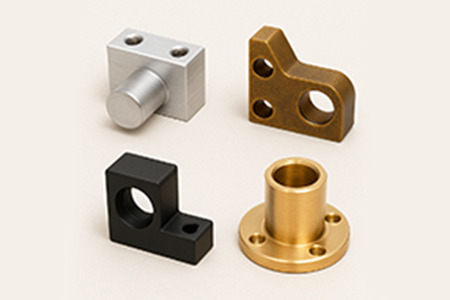
CNC machining is a versatile process that can work with virtually any metal or plastic material, making it a go-to method for manufacturing a wide array of cnc machined parts using a cnc machine. From the robust strength of metals to the lightweight versatility of plastics, the materials you choose will significantly impact the performance and cost of your final product.
Understanding the advantages of each material helps in selecting the right one for a specific application. Consider the following when selecting a CNC material:
- Environmental conditions
- Intended uses
- Machinability
- Tolerances
- Cost With over 60 engineering metals and plastics available for CNC machining, the options are vast.
When machinability and cost are important factors, softer materials like plastics and aluminum are often chosen because they are easier to machine and cause less tool wear, leading to increased efficiency in manufacturing.
Common materials used in CNC machining include plastics, metals, wood, ceramics and composites. Each of these materials brings unique properties to the table and comparing them based on mechanical properties, thermal properties, cost and applications helps in making an informed decision. Clarwe offers a broad range of these common cnc materials and right cnc materials for cnc, ensuring that your CNC machining projects can meet any specific requirement or challenge.
Metals Used in CNC Machining
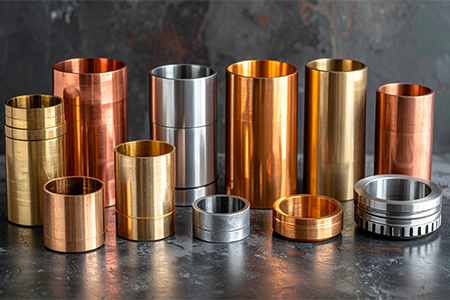
Metals are the backbone of CNC machining, loved for their strength, hardness and temperature resistance. CNC machining uses metals such as:
- Brass
- Copper
- Stainless steel
- Aluminum
These are used for specific properties and applications. Metals are used for high strength and durability applications like aerospace and automotive parts. Metals like aluminum are also used to make production parts in industries like automotive and aerospace.
Metals have thermal resistance, hardness and high strength so they are used for demanding applications. Among the most common metals used in CNC machining are aluminum and stainless steel because of their properties and versatility.
This section will cover specific metals and metal alloys and other metals used in CNC machining and their characteristics and applications.
Aluminum Alloys
Aluminum alloys 6061 and 7075 are highly sought after in CNC machining for their mechanical properties, corrosion resistance and machinability. Aluminum 6061 is versatile, good machinability, lightweight and corrosion resistant and is used in many industries. It's used in automotive components where these properties are key.
Aluminum 7075 is machinable and is used in aerospace due to its strength to weight ratio. Whether you need a mill finish or brush finish, EN AW–7075 can be tailored to your aesthetic and functional requirements.
Stainless Steel Alloys
Stainless steel alloys 303, 304 and 316 are staples in CNC machining. Their corrosion resistance makes them ideal for applications where durability and longevity is paramount. For example stainless steel 1.4404 has improved corrosion resistance and stability against chloric and non-oxidizing acids and is suitable for harsh environments. Some stainless steel grades like 303 have lower corrosion resistance than others like 304 and should be considered when selecting materials for specific environments.
Stainless steel is however very difficult to machine due to its hardness. Its heat resistance, chemical resistance and high tensile strength (590 MPa for grade 1.4301) makes it essential in industries from marine to high temperature applications.
Carbon Steels and Alloy Steels
Carbon steels and alloy steels are strong and machinable, especially when heat treated. But carbon steel is not corrosion resistant, which can be a problem for aesthetic applications. Despite that it's cheap and versatile it's a popular choice for many applications, screws, forgings and general purpose items like jigs and fixtures. Medium carbon steel is used for these applications because of its strength and ductility balance.
Alloy steels like 4140 and 42CrMo4 have better mechanical properties like strength, toughness and impact resistance so it's suitable for demanding applications like machine construction and gear manufacturing. Alloy steel is for projects that require durability and high performance under stress.
Titanium Alloys
Titanium alloys are great for high strength to weight ratio and are critical in aerospace where weight is key. Grade 2 titanium is used in weight saving structures and medical applications due to its excellent corrosion resistance.
Grade 5 titanium alloy with its strength and low weight is highly prized in aerospace for its performance.
Also due to its excellent corrosion resistance titanium alloys are also suitable for marine applications where saltwater is a concern.
Copper Alloys
Copper and its alloys like brass are known for its excellent electrical conductivity and malleability. Brass C36000 is one of the most machinable materials with high tensile strength making it a favorite in electrical and electronics industry. Copper is used in electrical wires and magnetic devices while brass is used in general electrical components.
Moreover brass is naturally corrosion resistant and is used in applications where durability and reliability is required. Its machinability, corrosion resistance and electrical conductivity makes it ideal for precision components and electrical applications.
Plastics Used in CNC Machining
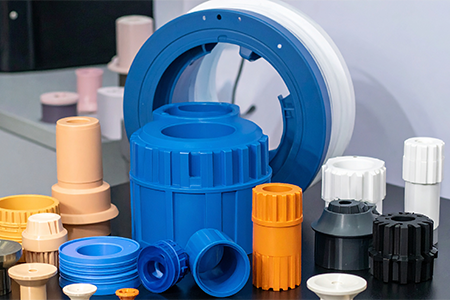
Plastics are another type of material used in CNC machining. PEEK, Acetal, Nylon, ABS and Polycarbonate are common plastics each with their own properties that make them suitable for different applications. For example PVC is a low cost, highly machinable plastic with impact resistance and high strength and stiffness so it's great for chemical tanks and valve housings.
Acetal (POM or Delrin) is a lightweight plastic with good wear and moisture resistance. POM (Delrin) is considered an economical plastic because it's affordable and machinable. High density polyethylene (HDPE) has high strength to weight ratio and weather resistance so it's used in precision components and outdoor applications including extreme environments. HDPE is also electrically insulating so it's great for electrical components and safety applications.
This section will go into specific types of plastic materials and their physical properties and applications. POM (Delrin) is often considered the most economical plastic for CNC machining projects.
ABS (Acrylonitrile Butadiene Styrene)
ABS is a popular thermoplastic known for its strength and durability. Great impact strength for protective enclosures and automotive parts.
With a density of 1.00 to 1.05 g/cm3, ABS offers good dimensional stability for applications from prototyping to manufacturing automotive parts.
Polycarbonate (PC)
Polycarbonate (PC) is great for optical clarity, shatter resistance, heat resistance, strength, stiffness, impact resistance and toughness. Good for high temperature applications and many uses, including electronic components, medical devices, machine guards and automotive parts.
Good for CNC milling. Also good for turning.
Nylon
Nylon is great for CNC machining because of its low friction. Plus it self lubricates. Key properties:
- Abrasion resistant thermoplastic: Nylon is very abrasion resistant, tough and durable against wear and mechanical friction.
- Low friction
- Self lubrication
- Sprockets
- Bearings
- Sliding surfaces
- Gears
Nylon is good for parts that need durability and low wear. Different grades of nylon like Nylon 6 and Nylon 66 are used for their unique properties and tight tolerances.
Applications of nylon in CNC machining for industrial applications include:
Nylon parts can withstand demanding conditions and perform well.
PEEK (Polyether Ether Ketone)
PEEK is known for its excellent chemical resistance and high temperature tolerance, it's good for harsh environments. Its strength, stiffness and wear resistance makes it durable in many applications, especially in aerospace and medical where resistance is critical. PEEK is also used in food processing equipment because of its chemical resistance and high temperature. Medical grade PEEK is made to meet the strict requirements of medical devices and implants.
PTFE (Teflon)
PTFE also known as Teflon is low friction and chemical resistant. But machining PTFE is challenging because it deforms under cutting forces making precision work difficult.
Despite the challenges PTFE's low friction properties makes it good for applications with sliding and moving parts. PTFE is also used in laboratory equipment for its chemical resistance and durability.
Heat Resistant Materials
Heat resistant materials are key in CNC machining especially for industrial applications that are exposed to high temperatures or extreme environments. These materials are designed to maintain their structure and performance even when subjected to high heat, that's why they are essential in industries such as aerospace, automotive and chemical processing.
Stainless steel alloys like 304 and 316 are the most commonly used heat resistant materials in CNC machining. They have excellent corrosion resistance and can withstand high temperatures, perfect for components that are exposed to harsh conditions. Titanium alloys are another top choice, they have high strength to weight ratio, corrosion resistance and thermal resistance. These properties make titanium alloys ideal for aerospace and medical applications where durability and weight savings are critical.
Some plastic materials like polyether ether ketone (PEEK) and polyimide also have heat resistance. These plastics can withstand high temperatures without degrading, perfect for industrial applications where metal materials are too heavy or conductive. By choosing the right heat resistant materials, manufacturers can ensure that CNC machined parts will perform well in the most demanding environments.
Factors Influencing Material Selection in CNC Machining
Choosing the right material for CNC machining has a big impact on cost, mechanical properties and end product performance. Mechanical properties like tensile strength and ductility are key to how a material will behave during machining. Use of the product, environmental conditions and stress loads also play a big role in material selection.
Understanding CNC machines and materials compatibility is key to getting accurate and efficient machining results. Sustainable manufacturing is driving the use of eco-friendly materials in CNC machining like biodegradable plastics and recyclable metals.
This section covers strength, machinability, cost and surface finish requirements.
Strength and Durability
Material strength is key to performance in CNC machining. Strength, toughness and wear resistance is important for parts that are under stress or wear.
Heavier parts need stronger materials, lighter parts can use lower density materials like aluminum or titanium.
Machinability
Machinability can have a big impact on production time. Machinability is the ease in which a material can be cut or machined, it affects the choice of CNC materials. Materials with better machinability will reduce production cost due to less labor and tool wear.
Choosing materials based on machinability optimizes production and controls cost through a good manufacturing process.
Cost and Budget
Balancing performance and cost is key to managing budgets. Some materials will give better performance for the price and that will influence your budget choices. Machinability saves long term time and money.
Effective cost management requires understanding material properties and machinability.
Surface Finish
Different surface finishes can enhance both the aesthetic and functional performance of machined parts. Surface finish is critical in CNC machining as it affects both the aesthetic and functional of a part.
Material choice is influenced by surface finish and machining method. Aligning surface finish with material is key to optimizing performance and cost of CNC machining.
Tips for Working with Different CNC Machining Materials
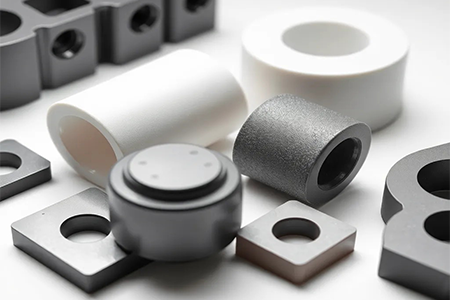
When working with different CNC machining materials you need to understand how they interact with tools and processes. The choice of CNC machining materials for parts is dependent on the part being made. Here are the common surface finishes for CNC machined parts:
- Polishing
- Anodizing
- Passivation
- Painting
- Brushing
- Powder coating
Material selection affects tool life and maintenance.
Metal looks in CNC machining can be improved with post processing surface finishes. Good tools and reliable work-holding is also key to getting repeatable high precision results.
This section has practical tips on tooling, work-holding and info on common machining materials.
Quality Tooling
Good tooling means less replacements and better machining. Precise and durable tools mean less errors and longer life.
Good tooling is key to precision in CNC machining, less tool changes and better parts with tight tolerances.
Reliable Work-holding
Reliable work-holding because:
- More precision and accuracy.
- Less part movement during machining.
- Consistent results by no part movement.
Good work-holding techniques that minimize vibration will prevent inaccuracies and overall better quality.
Common Machining Materials
Aluminum alloys are used in CNC machining because they are light and machinable. Stainless steel is used in CNC because it's strong and corrosion resistant. Titanium is used because of its strength to weight ratio and is used in medical and aerospace applications.
Copper alloys are used for their electrical and thermal conductivity, especially in electrical applications. Brass, an alloy of copper and zinc, is durable and machinable and is used in plumbing and electrical applications.
Nylons and PEEK plastics are becoming popular in CNC machining because they are light and chemical resistant. Low carbon steel is cheap and easy to machine and is used in many applications.
These have many properties so there's an option for any CNC machining project.
CNC Machined Parts: Real World Applications
CNC machined parts are used across many industries because of the process's ability to produce high precision and consistency. In the automotive industry CNC machined components are in engines, transmissions and suspension systems where durability and tight tolerances are key. The aerospace industry uses CNC machining for aircraft structures, engine parts and satellite components where accuracy and performance under extreme conditions is critical.
In the medical industry CNC machined parts are used to make surgical instruments, implants and advanced medical equipment where precision and reliability can mean life or death for the patient. Consumer products also use CNC machining for electronic components and custom hardware. The versatility of CNC machining allows for the production of simple and complex parts so industries can meet their specific requirements for quality, performance and innovation.
Injection Molding and CNC Machining: Material Selection
When it comes to making plastic parts, both injection molding and CNC machining are popular methods, each with its own material selection criteria. Choosing the right materials for these processes involves looking at mechanical properties, thermal resistance and chemical resistance to get the best performance and durability.
For injection molding and CNC machining, common plastic materials are polypropylene, polyethylene and polycarbonate. Polypropylene is great for chemical resistance, impact resistance and thermal resistance so it's popular for automotive and consumer products. Polyethylene is good for abrasion resistance, chemical resistance and low cost so it's ideal for packaging and industrial equipment. Polycarbonate is great for impact resistance, thermal resistance and optical clarity so it's good for electronic components and medical equipment.
By considering the material properties required for each application, manufacturers can choose the right materials for their injection molding and CNC machining projects. This means they can produce high quality parts that meet the needs of various industries from medical equipment to consumer products and beyond.
Conclusion
Choosing the right material for CNC machining is key to cost, performance and longevity of the end product. Metals like aluminum, stainless steel, carbon steels, titanium and copper alloys are robust for demanding applications and plastics like ABS, polycarbonate, nylon, PEEK and PTFE are versatile for various industries. Knowing the factors that affect material selection like strength, machinability, cost and surface finish will help you make informed decisions to ensure success of your CNC machining projects. Invest in good tooling and reliable work-holding and you will get high precision and optimal performance of your machined parts. Choose wisely and let the material be the foundation of your success.
FAQ's about CNC Machining Materials
What are the most popular metals for CNC machining?
The most popular metals for CNC machining are aluminum, stainless steel, carbon steel, titanium and copper alloys chosen for their strength and machinability for various applications. This covers all bases for optimal performance and versatility in manufacturing.
Why is 6061 aluminum so popular for CNC machining?
6061 aluminum is popular for CNC machining because of its versatility, excellent machinability, lightweight and corrosion resistance making it suitable for many applications including automotive parts.
Why is PEEK good for high performance applications?
PEEK is good for high performance applications because of its chemical resistance, high temperature tolerance and high strength and stiffness making it very valuable in aerospace and medical industries.
How does machinability affect the cost of CNC machining?
Machinability has a big impact on the cost of CNC machining by affecting production lead times and tool wear; materials with better machinability means less labor and tool costs and ultimately lower overall production costs.
What to consider when choosing a material for CNC machining?
When choosing a material for CNC machining you need to consider the application, environmental conditions, mechanical properties, machinability, cost and surface finish requirements as these will ensure optimal performance and stay within budget.

